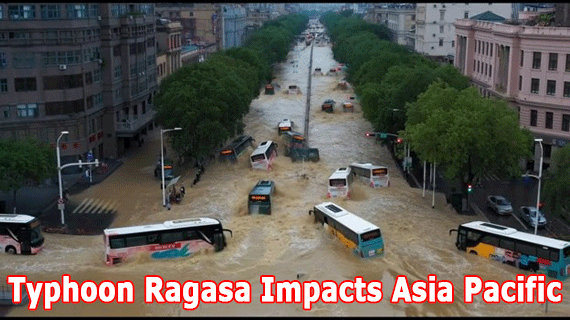 |
The destruction in Shanghai last week as Super Typhoon Ragasa pounded the city was described as “horrific”.
“It’s been 75 years, not since 1949 has our city been impacted like this,” was one observation.
“Cargo operations, land, sea and air out of South China are still being impacted in various degrees this week after Typhoon Ragasa made landfall early last week, forcing the closure of factories in the manufacturing hubs, shuttering several container terminals across major seaports and grounding flights at airports.
The storm, that claimed the lives of 17 people in Taiwan and 10 more in the Phillipines, tops the list of altercations with nature experienced in the northwestern Pacific and South China Sea region so far this year, according to the Hong Kong Observatory ?????.
Although Ragasa was downgraded quickly as the storm moved on, shipping delays across ocean and air freight at some of South China's largest logistics operations continue this week.
Seko Logistics told reporters 'expect up to seven day delays' dating back to last Thursday when regular service staggered back across the region.
Airport Authority Hong Kong HKIA, the busiest cargo airport in the world that handled 4.9 million metric tons of cargo during 2024, shut down all flights but reportedly came back Wednesday with some freighter services and was open for business once again last Friday.
Cathay Pacific, HKIA's biggest carrier said Typhoon Ragasa impacted 500 flights whilst HKIA said that more than 1,000 flights, all told were affected.
Flightradar24 said that about three-quarters of all aircraft operated by the four main airlines based in Hong Kong were relocated to other airports out of harm's way in China, Japan, Cambodia, Europe, Australia and other locations.
All of this upheaval comes just as much of China was focused on the upcoming "Golden Week" Holiday that takes place Oct. 1-7.
According to data from air cargo market research firm Rotate, 30,000 metric tons of cargo across China, Hong Kong and Taiwan will have been held up through Thursday morning.
Interestingly earlier this Summer of 2025 during the opening ceremony of the WAIC - World Artificial Intelligence Conference Artificial Intelligence on July 26, the China Meteorological Administration (CMA) launched MAZU, a Joint Action for Early Warnings for All, to build an Early Warning Service Network and to share practical experience and technological achievements with global partners.
“Climate changes (including strength of typhoons) are a critical challenge threatening humanity in the 21st century.”
GDA
|





 Vol. 24. No. 40
Vol. 24. No. 40